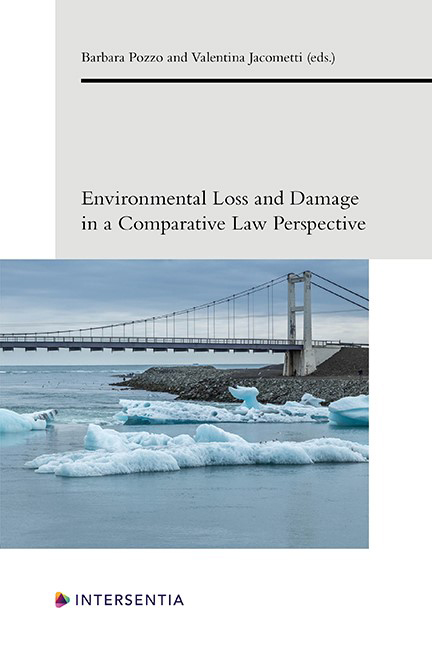Book contents
- Frontmatter
- Preface
- Contents
- List of Authors
- PART I LIABILITY FOR ENVIRONMENTAL HARM IN THE EU
- PART II PRIVATE AND CORPORATE ENVIRONMENTAL LIABILITY
- PART III THE ROLE OF CRIMINAL LIABILITY
- PART IV LEGAL TRANSPLANTS IN THE ENVIRONMENTAL FIELD: THE CASE OF ENVIRONMENTAL LIABILITY
- PART V STATE AND INTERNATIONAL ENVIRONMENTAL LIABILITY
- PART VI CLIMATE CHANGE LIABILITY
- PART VII LIABILITY, CLIMATE CHANGE AND NATURAL HAZARDS: THE ROLE OF INSURANCE
- PART VIII REAL COMPENSATION AND OFFSET REGIMES: THE STRATEGY OF “NO NET LOSS”
- About the Editors
The Right to a Healthy Environment and its Consequences for Other Human Rights: A Challenging Approach
Published online by Cambridge University Press: 26 May 2021
- Frontmatter
- Preface
- Contents
- List of Authors
- PART I LIABILITY FOR ENVIRONMENTAL HARM IN THE EU
- PART II PRIVATE AND CORPORATE ENVIRONMENTAL LIABILITY
- PART III THE ROLE OF CRIMINAL LIABILITY
- PART IV LEGAL TRANSPLANTS IN THE ENVIRONMENTAL FIELD: THE CASE OF ENVIRONMENTAL LIABILITY
- PART V STATE AND INTERNATIONAL ENVIRONMENTAL LIABILITY
- PART VI CLIMATE CHANGE LIABILITY
- PART VII LIABILITY, CLIMATE CHANGE AND NATURAL HAZARDS: THE ROLE OF INSURANCE
- PART VIII REAL COMPENSATION AND OFFSET REGIMES: THE STRATEGY OF “NO NET LOSS”
- About the Editors
Summary
INTRODUCTORY CONSIDERATIONS ON THE RIGHT TO A HEALTHY ENVIRONMENT
The environmental challenges of current times, especially those registered in recent decades, have had dramatic effects on people's health and affected the quality of their everyday life. These consequences have led to the shaping of a new human right that was not provided for in the European Convention on Human Rights (ECHR), but is becoming more and more important both at the national and international level. This is the right to a healthy environment, which “is intended to ensure that everyone has access to clean air, safe water, fertile soil and nutritious food, as well as the conservation of biological diversity an ecosystem functions”.
The first formal articulation of the right to a healthy environment occurred in 1972, with the adoption of the Stockholm Declaration, which stated in its Principle 1: “Man has the fundamental right to freedom, equality and adequate conditions of life, in an environment of a quality that permits a life of dignity and well-being, and he bears a solemn responsibility to protect and improve the environment for present and future generations.”
It is beyond doubt that at present times, the right to a healthy environment is a genuine human right because it meets the three general features of any other human right – it is universal, moral and essential:
(a) it is universal because it is held by all human beings;
(b) it is moral because it exists for certain, no matter whether a state, authority or legal system recognises it or not;
(c) it is essential because it ensures the dignity and quality of life of all human beings living on our planet.
As a matter of fact, the issue of declaring and recognising the right to a healthy environment as a fundamental human right is settled, since 92 per cent of the world's countries recognise it as so through their fundamental laws, special legislation or case law, in addition to an important number of treaties and declarations adopted or ratified by them. Of course, these numbers do not suggest also that this important human right is also being adequately enforced.
- Type
- Chapter
- Information
- Environmental Loss and Damage in a Comparative Law Perspective , pp. 371 - 382Publisher: IntersentiaPrint publication year: 2021



